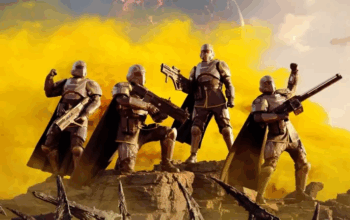Star Wars has always made heavy use of recurring themes and motifs including family legacy, balancing one’s emotions, and of course, the rebellious spirit of resisting oppression. What is not often explored, at least on the surface, is the theme of sacrifice.
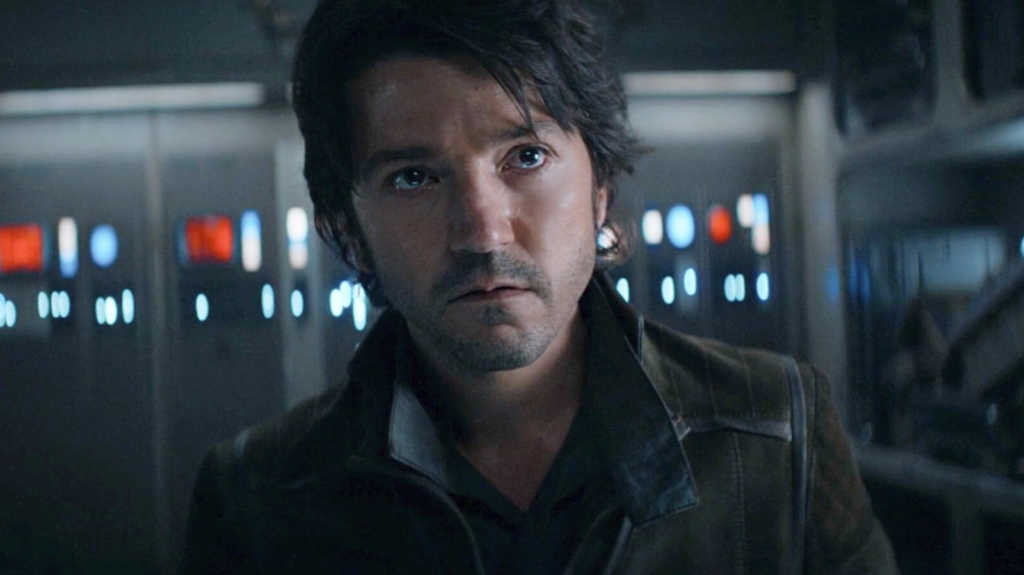
In every war there is no victory without losses – almost always severe ones. Those are often words that now have far more meaning than previous SW projects convey.
Until Andor, there was never a deep exploration of the theme of sacrifice. That is, actually exploring the personal cost every character paid, beyond just their own lives.
Some may think of Darth Vader sacrificing himself to save his son Luke, but that was done at the cost of one’s life to redeem himself. In contrast, Andor is about people sacrificing souls for a greater purpose – whether it be their own or someone else’s. Such sacrifices mean leaving behind or hiding your personal desires, sometimes even your own humanity, to the point where the audience has a hard time telling the moral difference between the Empire and the very factions fighting against it.

The difference between The Empire and The Rebellion ultimately becomes not undertaking what actions can be deemed morally right – both sides will have to kill millions in this struggle – but rather what ideal you treasure more: Order, or Freedom.

Andor’s Sacrifice: Peace

Cassian Andor‘s one single motivation at the start of the series is to look for his long-lost sister and escape to a better life beyond Imperial oppression. For so long he thought by simply moving somewhere far off and keeping quiet Andor believed that all would blow over and live a simple life. However, No matter how low he tries to keep, The Empire’s reach is far. Being simply in the wrong place at the wrong time can be enough to turn your life upside down.

What Andor sacrifices, in the end, is his will for a peaceful life.
If he is going to commit to fighting the Empire the life he knows must come to an end, the death of his adoptive mother was the final turning point. With nothing else to live for, he can either die or become part of a cause greater than his life. In a way, he’s already reached the midstage of the downward spiral of his now mentor. Luthen. When Cassian confronts Luthen at the end of the season his intentions are explicit: he knows he is going to either die on the spot or step into a world there was no return.
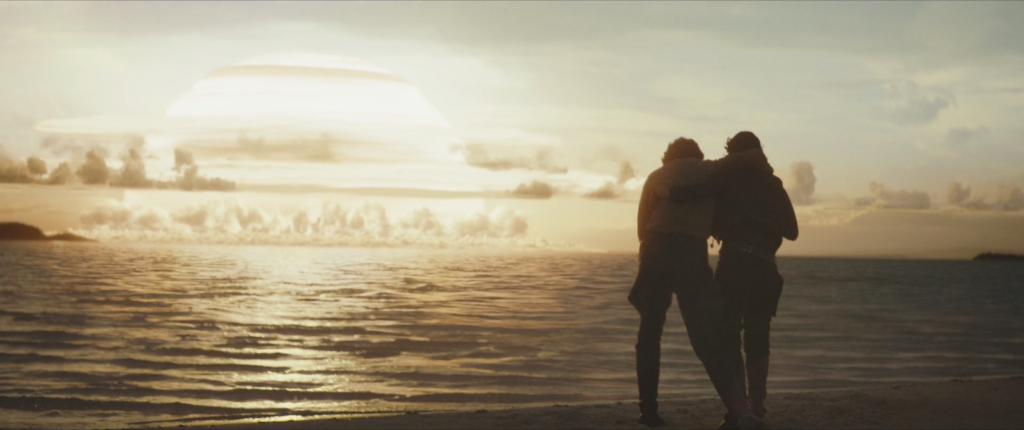
Luthen’s Sacrifice: Life
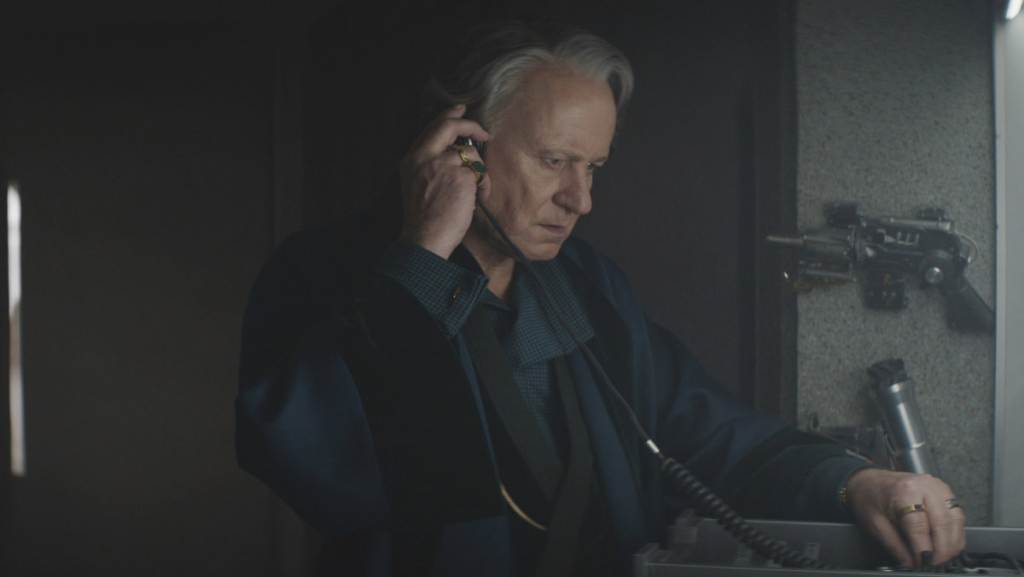
Easily the best character that exemplifies those themes is Luthen Rael. His entire story amounts to something of a cautionary tale of when you dedicate your entire life to a cause to which there is no joy.

It is clear that Luthen has been organizing anti-imperialism movements for a long time, and his unwillingness to form familial attachments to anyone personifies his desire. There is so much about this character that we do not know, his backstory, life before The Empire or even his real family is a kept a mystery to the audience.
His personal cause thus far is the downfall of The Empire no matter the cost. Even throwing other rebel cells under the bus for the survival of others that are more useful, like Saw Gerrera.

Related Article: Saw Gerrara’s Sh*t List: The Rebel Factions of “Andor” Explained.
Luthen is one of those characters that’s a step away from being a villain because so much of his joy and humanity has been sacrificed for his personal cause, which can be no better illustrated in his monologue to his ISB contact.
Mon Mothma’s Sacrifice: Family
If Luthen represents someone who has fallen all the way, Senator Mon Mothma is the one that is beginning the very slip down the slope.
Her story this season revolves around the fact that The Empire is monitoring her financial accounts that she donates to “public charities” openly – but in reality, are used to fund the opposition movements.
Sacrifices are not unknown to Mon, as her culture is one that is mired in traditions of “family values”. Mon Mothma’s home planet of Chandrila appears to have certain traditions some would describe as fuedal. She sacrifices personal freedom in keeping up with tradition.
Needless to say, Mon Mothma has a challenging life in managing her public persona and private life. Next to Padme, Mothma became one of the youngest serving politicians at the start of the Clone Wars, becoming a senator at just 16. Furthermore, in the costumes of her home planet, marrying another Chandrillan noble, Perrin Fertha. Whether this marriage was arranged or Mothma made the match herself is unclear, one this is certain this is not a match made with love in mind.
Despite being married for a long time and having a daughter Leida, Mothma never seemed to develop a close relationship with her Husband, forming more of a formality, only being together to keep up appearances.
Mothma instead concentrates her career on preserving the ideals that the republic is based on. However, no matter how much she fights to preserve the Republic the Imperial Senate does not hold those ideals. In a way, they were never there.
This sentiment was not lost on Mothma as Even her own daughter Lieda seemed increasingly distant and taking up more of her father’s beliefs, much to her concern.
This personal battle between public service and moral justice would be put to the test in order to secure the future of her opposition since the empire has been motoring Mothma’s finances in the wake of Anodr’s robbery. She can no longer distribute her financial support to her Republican opposition without being caught. In a clever reveal at the finale, Mon Mothma successfully gaslights her husband about his gambling habits and leaks that to her driver, who she knows is an ISB spy. This gives the ruse to the authorities that Mothma’s withdrawals were the result of her husband’s gambling, throwing the empire off her scent for now.

Selling out her husband was relatively easy since it’s clear their relationship has been kept a distance. It’s not a happy marriage that clearly kept for appearances. It’s clear that their closeness has been over for years.
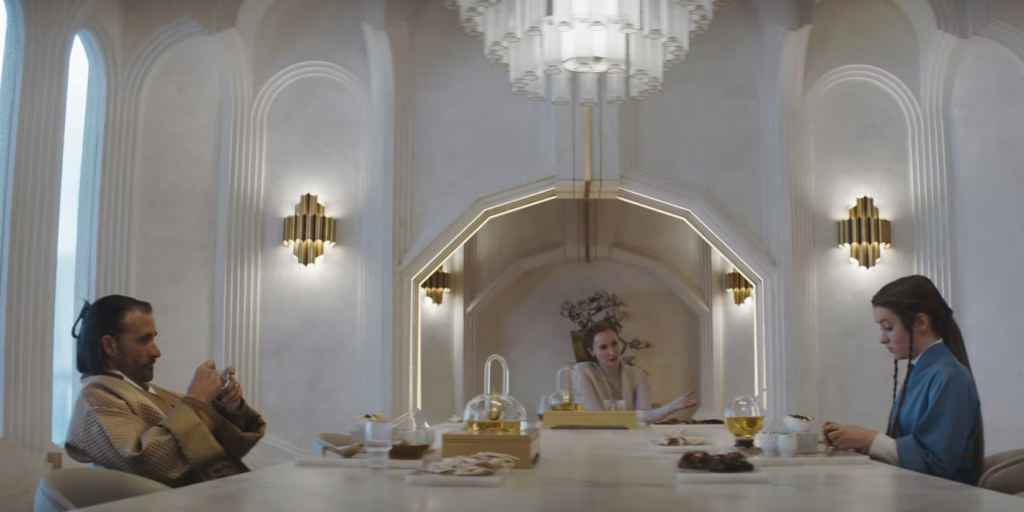
Mothma wants to restore The Republic from Palpatine’s grip, while Perrin wants to be embraced by the Imperial elite. Throwing her husband under the bus is relatively easy. It’s affairs involving her daughter Lieda, however, where it gets complicated.

In order to keep Mothma’s transactions a secret, she is forced to arrange an “informal betrothal meeting” between her and the son of a shady Chandrillan banker. In effect, Mothma would give away her daughter for the “greater good”.
It is uncertain how this plotline will continue in the second season. Regardless Mothma’s has tended a very morally questionable game. However, for the Sake of preserving and restoring democracy and freedom, personal sacrifices sometimes have to be included, especially when it comes to secrecy.
Perhaps this final step of detaching from her family would allow her to fully dedicate her life to the cause of restoring the republic.
Conclusion

Part of the strength of Andor is its world-building. Despite this galaxy being so advanced many of these planets have not lost their feudal costumes, including marriage alliances. For some systems, no matter how advanced things may seem, traditions persist. It was at this moment that Mon Mothma, for the first time, is truly learning how to play the game. Sometimes even your family can be used in this chess game between power and freedom.

What makes Andor so unique in Disney’s star wars lineup is it’s dealing with characters that are morally grey It’s not like other supposedly shady characters like Han Solo or Din Dijarin who do the right thing in the end, but people that had crossed the moral boundary to where there’s no turning back. Considering that this timeline is in the midst of the early rebellion the moral distinction has not been drawn.

What Andor demonstrates the most compared to other Star Wars shows is when fighting an oppressive system, so many things have to be given – even one’s moral integrity.
Cassian is the one that made some but workable sacrifices, Luthen had to Sacrifice his humanity, and Mothma had to sacrifice just one, but it’s the last personal joy she had. Regardless of how this plays into season 2, Mon Mothma most of all has truly begun to play this game that many, if not all revolutionaries, have to make.



